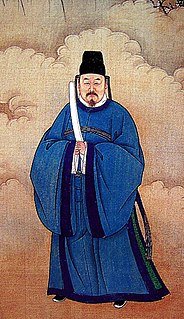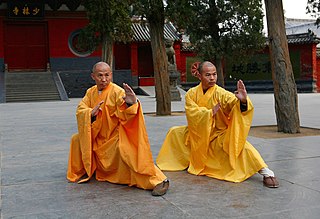This article concerns the period 119 BC – 110 BC.

劉 / 刘 is an East Asian surname. pinyin: Liú in Mandarin Chinese, Lau4 in Cantonese. It is the family name of the Han dynasty emperors. The character 劉 originally meant 'kill', but is now used only as a surname. Today, it is the 4th most common surname in Mainland China as well as one of the most popular surnames in the world.

Zhang is the third most common surname in mainland China and Taiwan, and it is one of the most common surnames in the world. Zhang is the pinyin romanization of the very common Chinese surname written 张 in simplified characters and 張 in traditional characters. It is spoken in the first tone: Zhāng. It is a surname that exists in many languages and cultures, corresponding to the surname 'Archer' in English for example. In the Wade-Giles system of romanization, it is rendered as Chang, which is commonly used in Taiwan; Cheung is commonly used in Hong Kong as romanization.
The Five Tiger Generals is a popular appellation in Chinese culture for the top five military commanders serving under one lord. Although the term does not appear in Chinese historical records and is not used officially, it has been heavily used in literature texts, folklore, as well as popular culture.

Emperor Zhang of Han, born Liu Da (劉炟), was an emperor of the Chinese Han dynasty from 75 to 88. He was the third emperor of the Eastern Han.
Dynasties in Chinese history, or Chinese dynasties, were hereditary monarchical regimes that ruled over China during much of its history. From the inauguration of dynastic rule by Yu the Great in circa 2070 BC to the abdication of the Xuantong Emperor on 12 February 1912 in the wake of the Xinhai Revolution, China was ruled by a series of successive dynasties. Dynasties of China were not limited to those established by ethnic Han—the dominant Chinese ethnic group—and its predecessor, the Huaxia tribal confederation, but also included those founded by non-Han peoples.

Jinshi was the highest and final degree in the imperial examination in Imperial China. The examination was usually taken in the imperial capital in the palace, and was also called the Metropolitan Exam. Recipients are sometimes referred to in English-language sources as Imperial Scholars.
Taizu is a temple name typically, but not always, used for Chinese monarchs who founded a particular dynasty. It may refer to:
The grand chancellor, also translated as counselor-in-chief, chancellor, chief councillor, chief minister, imperial chancellor, lieutenant chancellor and prime minister, was the highest-ranking executive official in the imperial Chinese government. The term was known by many different names throughout Chinese history, and the exact extent of the powers associated with the position fluctuated greatly, even during a particular dynasty. During the Six Dynasties period, the term denoted a number of power-holders serving as chief administrators, including zhongshun jian, zhongshu ling, shizhong, shangshu ling and puye.

Gu is a Chinese family name. Some places such as South Korea, and early immigrants from Wu-speaking region in China usually romanize this family name as "Koo" or "Ku". It is the 93rd name on the Hundred Family Surnames poem.
Zhang Hua (232–300), courtesy name Maoxian, was a Chinese poet and politician of the Jin dynasty. He previously served in the state of Cao Wei during the Three Kingdoms period. He authored Bowuzhi, a compendium of stories about the supernatural.

Chuōjiǎo is a Chinese martial art that comprises many jumps, kicks, and fast fist sequences. The fist and feet work in unison and strike continuously forward, like "falling meteorites", never giving the opponent a moment to recover. The qinggong portion of this style's training involves a practitioner jumping against a wall with heavy weights affixed to his/her calves. This style is practiced mainly in central Hebei, northern China, Beijing and Liaoning in North-eastern China.

The Prince of Han Dynasty is a three-season Chinese television series featuring a fictionalised life story of Liu Che, Emperor Wu of the Han Dynasty. Season 1 was first broadcast on Beijing Television in 2001 in mainland China, followed by the second and third seasons in 2003 and 2005 respectively. Except for Huang Xiaoming, who played Emperor Wu in all three seasons, the cast members in each season are almost different from its preceding one.

The Temple of the Eastern Peak in Beijing is a Taoist temple in the Chaowai area, Chaoyang District, Beijing, China. The temple is dedicated to the Great Deity of the Eastern Peak. "Eastern Peak" is the cosmological name of Mount Tai, the easternmost and holiest of the Five Sacred Mountains of China. Founded during the Yuan dynasty, the Eastern Peak Temple is the largest temple of Zhengyi Taoism in Beijing and protected as a national cultural spot. The temple also hosts the Beijing Folk Customs Museum.

Qian, also spelt Chin, Chien, Tsien, or Zee in Wu Chinese, is a common Chinese family name. The name literally means "money". Qian is listed at the second place in the Song Dynasty text Hundred Family Surnames, in the line 趙錢孫李. As the royal surname of the kingdom of Wuyue, Qian was regarded as second only to Zhao, the imperial surname of the Song. As of 2008, Qian is the 96th most common surname in China, shared by 2.2 million people, with the province with the most people sharing the name being Jiangsu, an area formerly within the Wuyue kingdom.

God of War, Zhao Yun, also known as Chinese Hero Zhao Zilong, released under the title Dynasty Warriors in Indonesia, is a 2016 Chinese television series directed by Cheng Lidong and produced by Zhejiang Yongle Entertainment Co., Ltd. The series starred cast members from mainland China, South Korea and Taiwan: Lin Gengxin, Im Yoon-ah and Kim Jeong-hoon. The story is loosely adapted from the 14th-century Chinese classical novel Romance of the Three Kingdoms, with Zhao Yun as the main character. It was first aired on Hunan TV from 3 April to 7 May 2016.









